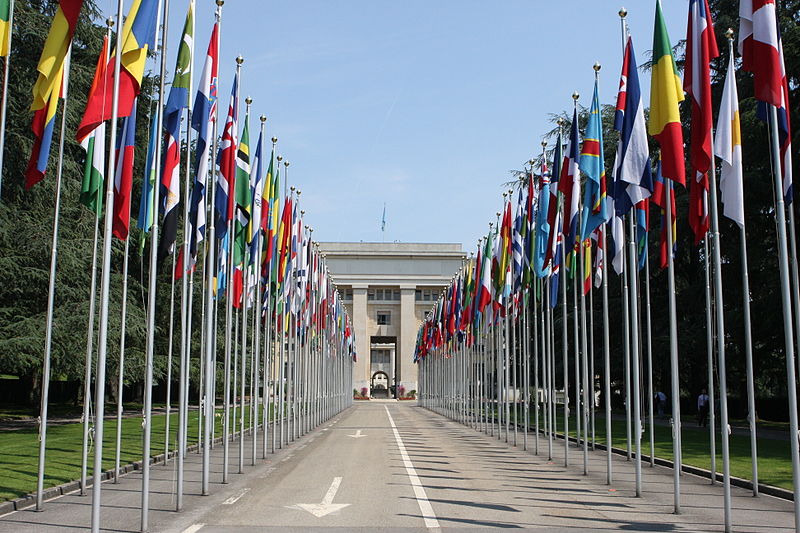The new Open-ended Working Group (OEWG), established in United Nations General Assembly Resolution 70/33 adopted in December 2015, opened on 22 February in Geneva. It will meet over the course of 15 working days in February, May and August of 2016 and submit a final report in October.
This OEWG emerged out of a resolution tabled at the First Committee in October 2015 (then put forward to the UNGA in December) by Austria, Brazil, Chile, Costa Rica, Ecuador, Georgia, Ghana, Ireland, Kenya, Liechtenstein, Malta, Marshall Islands, Mexico, Nicaragua, Nigeria, Panama, Peru, Philippines, South Africa, Trinidad and Tobago, Uruguay and Venezuela as lead sponsors. Its mandate is to:
- to substantively address concrete effective legal measures, legal provisions and norms that will need to be concluded to attain and maintain a world without nuclear weapons;
- to substantively address recommendations on other measures that could contribute to taking forward multilateral nuclear disarmament negotiations, including but not limited to:a) transparency measures related to the risks associated with existing nuclear weapons;
b) measures to reduce and eliminate the risk of accidental, mistaken, unauthorized or intentional nuclear weapon detonations; an
c) additional measures to increase awareness and understanding of the complexity of and interrelationship between the wide range of humanitarian consequences that would result from any nuclear detonation.
Why is this important?
This newly established OEWG takes place 70 years after of the UN General Assembly’s first resolution, on nuclear disarmament, and follows in the footsteps of a similar working group that met throughout 2013 and submitted a final report that September. Nuclear weapons have recently been in the headlines, in the adoption and implementation of the Iran Nuclear Deal, North Korea’s nuclear tests, and the continuing debate over the renewal of Trident in the UK. The issues tend to focus on non-proliferation efforts rather than disarmament, or they are reactionary — perhaps even fear mongering — analyses or political positioning. Unfortunately what is missing are the bigger and longer term plans to reduce this global threat of nuclear weapons through disarmament. The significance of this OEWG is principally its renewed and clear focus on the disarmament agenda.
Nuclear disarmament does feature in the mandates of other fora, including the Nuclear Non-Proliferation Treaty and the Conference on Disarmament (see our factsheet on the international non-proliferation and disarmament regime for more information). But the OEWG arises from frustrations with the inaction on the part of nuclear weapons states that blocks consensus.
This OEWG is also addressing legal measures, legal provisions, and global norms that could be used to attain and maintain a world free from nuclear weapons. This is linked with efforts of some states and civil society groups that are working towards a treaty to introduce a ban on nuclear weapons.
Why haven’t you heard about it?
In December 2015, 138 countries voted to adopt the Resolution 70/33 that established the OEWG. However, many of the most relevant countries, particularly the five nuclear weapon states (the United Kingdom, United States, China, France and Russia) voted against it. In addition, 34 states, many of which are either members of NATO or under the US nuclear umbrella, abstained.
Even with former UN Secretary General Kofi Annan addressing the OEWG’s opening session, it is unfortunately rare for UN multilateral meetings to make the headlines. However, this being the first meeting of three throughout the year with a report not due until October means that there might not be much to report on just yet. We recommend the following sources for further information as it unfolds.
Further information:
- Open-ended Working Group’s page on the UNOG’s website
- Resolution 70/33 adopted by the General Assembly on 7 December 2015
- Provisional Agenda
- Indicative Timetable
- Panel I on substantively addressing concrete effective legal measures, legal provisions and norms that will need to be concluded to attain and maintain a world without nuclear weapons
- Panel II on substantively addressing recommendations on other measures that could contribute to taking forward multilateral nuclear disarmament negotiations
- Statements from the February session of the open-ended working group on nuclear disarmament via Reaching Critical Will
- The Treatment of the Issue of Nuclear Disarmament since the Open-ended Working Group in 2013, UNIDIR, February 2016
- On Twitter, follow #OEWG
Image: Henry Mühlpfordt via Wikimedia Commons

